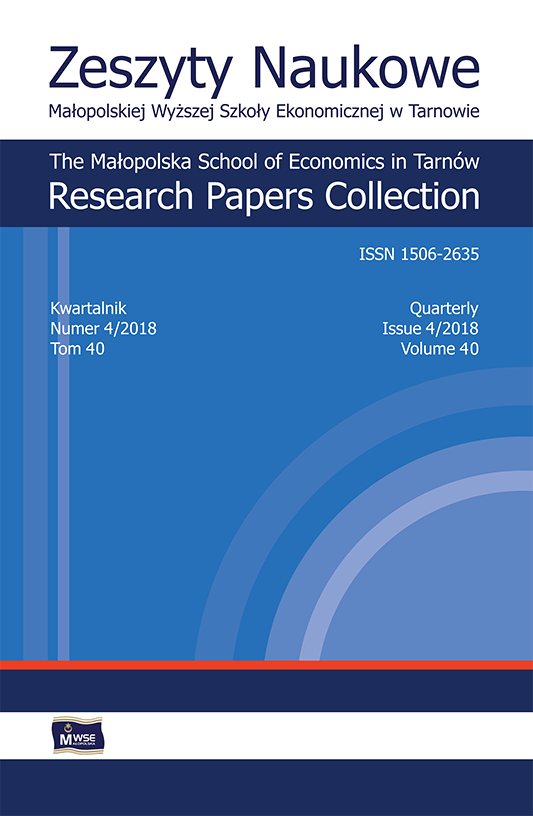Abstrakt
Artykuł stanowi opis projektu realizowanego na jednej z polskich uczelni wyższych. Autorzy starali się zwrócić uwagę na fakt, iż zastosowanie metody coachingu mogłoby pomóc osobom z niepełnosprawnościami w realizacji założonych celów zawodowych poprzez odkrywanie swojego potencjału. Osoby niepełnosprawne często bowiem napotykają na przeszkody w realizacji swoich założeń między innymi ze względu na przeszkody w otoczeniu. Autorzy zwrócili uwagę na to, że zastosowanie odpowiednio dobranych narzędzi podczas szkoleń i sesji coachingowych pozwoli studentom na pokonywanie barier w zdobywaniu upragnionego miejsca pracy. Artykuł składa się z dwóch części. Pierwszą stanowią rozważania teoretyczne na temat pojęcia coachingu. Drugą stanowi część empiryczna polegająca na opisie założeń do projektu, który jest prowadzony w jednej z uczelni wyższych w Poznaniu. W założeniach do projektu dokonano analizy niepełnosprawności studentów oraz zaproponowano najbardziej efektywne narzędzia coachingowe dla osób z konkretnymi niepełnosprawnościami. Analizy stanowią wstęp do kolejnych działań polegających na implementacji narzędzi coachingowych oraz analizie rezultatów.
Bibliografia
Bennewicz, M. (2011). Coaching i mentoring w praktyce. Warszawa: G + J Gunter + Jahr Polska. ISBN 9788362343546.
Zobacz w Google Scholar
Bowkett, S. (2000). Wyobraź sobie, że… Ćwiczenia rozwijające twórcze myślenie uczniów. Transl. by K. Kruszewski. Warszawa: Wydawnictwa Szkolne i Pedagogiczne. ISBN 8302076872.
Zobacz w Google Scholar
Brzeziński, Ł. (2013). Coaching narzędziem rozwoju zawodowego. Problemy Profesjologii, 2, 113–124.
Zobacz w Google Scholar
Confield, J., Chee, P. (2014). Coaching dla zwycięzców. Sprawdzone techniki urzeczywistniania marzeń i osiągania trudnych celów. Transl. by B. Jóźwiak. Poznań: Dom Wydawniczy Rebis. ISBN 9788378185567.
Zobacz w Google Scholar
Dilts, R. (2006). Od przewodnika do inspiratora, czyli Coaching przez duże „C”. Transl. by B. Szczepaniak. Warszawa: Wydawnictwo PINLP G. Peczko. ISBN 8392319508.
Zobacz w Google Scholar
Grant, A. M. (2001). Towards a psychology of coaching: The impact of coaching on metacognition, mental health and goal attainment [online, accessed: 2018-10-15]. Doctoral Dissertations. Macquarie University. Retrieved from: https://files.eric.ed.gov/fulltext/ED478147.pdf.
Zobacz w Google Scholar
Holiday, M. (2006). Coaching, mentoring i zarządzanie. Jak rozwiązywać problemy i budować zespół. Transl. by M. Głogowska. Gliwice: Helion. ISBN 8324601678.
Zobacz w Google Scholar
Hargrove, R. (2006). Mistrzowski coaching. Transl. by I. Podsiadło. Kraków: Oficyna Ekonomiczna. ISBN 8374840056.
Zobacz w Google Scholar
Kołodziejczak, M. (2015). Coaching i mentoring we wspieraniu sieci scoutów. In: P. Głodek, M. Wiśniewski (eds.). Budowa potencjału uczelni wyższej do współpracy z przedsiębiorstwami. Rola scoutingu wiedzy (pp. 53–66). Łódź: Wydawnictwo Uniwersytetu Łódzkiego. ISBN 9788379695652.
Zobacz w Google Scholar
Kozyra, B. (2015). Zarządzanie sobą. Zrozum siebie i zrealizuj marzenia. Warszawa: MT Biznes. ISBN 9788377469132.
Zobacz w Google Scholar
Kraczla, M., Wziątek-Staśko, A. (2016). Coaching jako nowoczesna metoda rozwoju kadry kierowniczej. Zeszyty Naukowe Wyższej Szkoły Humanitas. Zarządzanie, 1, 239–252.
Zobacz w Google Scholar
Kreyenberg, J. (2010). Coaching, czyli wspieranie rozwoju pracowników. Transl. by B. Moryl. Warszawa: Wydawnictwo BC.edu. ISBN 9788361655343.
Zobacz w Google Scholar
Paul-Cavallier, F. J. (2009). Wizualizacja. Od obrazu do działania. Transl. by A. Suchańska. Poznań: Dom Wydawniczy Rebis. ISBN 9788375102611.
Zobacz w Google Scholar
Pawlisiak, M. (2013). Coaching elementem doskonalenia zawodowego kadr logistycznych. Przedsiębiorczość i Zarządzanie, 14 (12, part 1), 177–188.
Zobacz w Google Scholar
Rogers, J. (2013). Coaching. Podstawy umiejętności. Sopot: Gdańskie Wydawnictwo Psychologiczne. ISBN 9788374892636.
Zobacz w Google Scholar
Rzycka, O. (2011). Zarządzanie i życie. Refleksje coacha. Warszawa: Difin. ISBN 9788376415369.
Zobacz w Google Scholar
Sidor-Rządkowska, M. (2015). Zastosowanie coachingu w przedsiębiorstwie – szanse i zagrożenia. Kwartalnik Nauk o Przedsiębiorstwie, 4, 45–53.
Zobacz w Google Scholar
Sidor-Rządkowska, M. (ed.). (2009). Coaching. Teoria, praktyka, studia przypadków. Kraków: Oficyna a Wolters Kluwer Business. ISBN 9788375266801.
Zobacz w Google Scholar
Starr, J. (2005). Coaching. Procesy, zasady, umiejętności. Transl. by G. Łuczkiewicz. Warszawa: Polskie Wydawnictwo Ekonomiczne. ISBN 8320815851.
Zobacz w Google Scholar
Thorpe, S., Clifford, J. (2004). Podręcznik coachingu. Transl. by A. Sawicka-Chrapkowicz. Poznań: Dom Wydawniczy Rebis. ISBN 8373015434.
Zobacz w Google Scholar
Vickers, A., Bavister, S. (2007). Coaching. Transl. by M. Kowalczyk. Gliwice: Helion. ISBN 9788324604920.
Zobacz w Google Scholar
Whitemore, J. (2011). Coaching. Trening efektywności. Transl. by M. Sobczak. Warszawa: G + J Gruner + Jahr Polska. ISBN 9788362343140.
Zobacz w Google Scholar
Whitworth, L., Kimsey-House K., Sandahl P. (2010). Coaching koaktywny. Umiejętności wspierające sukces klienta. Warszawa: Oficyna a Wolters Kluwer Business. ISBN 9788326404313.
Zobacz w Google Scholar
Wilczyńska, M., Nowak, M., Kućka, J., Sawicka, J., Sztajerwald, K. (2013). Moc coachingu. Poznaj narzędzia rozwijające umiejętności i kompetencje osobiste. Gliwice: Wydawnictwo Helion. ISBN 9788324679836.
Zobacz w Google Scholar
Wilson, C. (2010). Coaching biznesowy. Praktyczny podręcznik dla coachów, menedżerów i specjalistów HR. Transl. by M. Lisek-Derek. Warszawa: MT Biznes. ISBN 9788361732969.
Zobacz w Google Scholar
Wujec, B. (2012). Geneza i definicje coachingu. Coaching Review, 1 (4), 4–28.
Zobacz w Google Scholar
© Copyright by Małopolska Wyższa Szkoła Ekonomiczna w Tarnowie. Artykuły są udostępniane na podstawie Creative Commons Attribution Uznanie autorstwa - Użycie niekomercyjne - Bez utworów zależnych 4.0 Licencja Międzynarodowa


